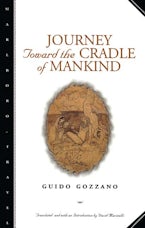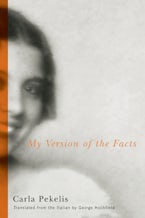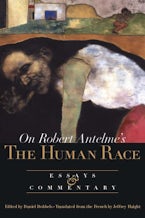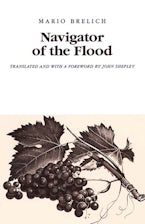Marlboro Press
Showing results 1-10 of 79
Filter Results OPEN +

Improbable Journeys
For more than four decades, poet Robin Magowan has journeyed in search of ecstatic spiritual experiences. Hitchhiking and walking, by bus or boat or when necessary by horse, he has explored lands as exotic as Nepal and New Guinea, as classic as Italy or France, and as forgotten as Persia and pre-Castro Cuba. All the while he has submerged himself, whether in the mysteries of Haitian voodoo or the simples pleasures of Burgundian peasant life. Known for the beauty, wit, and expressive power of his prose, Magowan's writing vibrates with the intensity of an outsider who crawls into the skin of a country--and emerges transformed.
C'est la Guerre
In C'est la guerre Louis Calaferte presents the World War II--from the moment its outbreak is announced to the public through the unprecedented disaster that ensues, and through France's liberation in 1945--as it registers itself in the ever more isolated consciousness of a young, nameless boy.
Journey toward the Cradle of Mankind
The distinguished Italian poet Guido Gozzano (1883-1916) embarked for India in February 1912, ostensibly to treat his tuberculosis. His trip lasted three months and, all told, he spent six weeks on the subcontinent. His dispatches home for a newspaper are collected and published here in English for the first time.
My Version of the Facts
"What did it mean to be a Jewish child in Italy at the beginning of the century?" Carla Pekelis asks herself. "As a matter of fact, nothing, absolutely nothing!" But shortly, as fascism began its march through her homeland and racial laws slowly constricted her world, Carla would learn that being a Jew in Italy might indeed have a profound meaning and dire consequences. Her recollections form an absorbing, nuanced portrait of a life transformed, and a world transfigured, by the relentless currents of history.
An Italian Journey
In An Italian Journey, Jean Giono describes his journey to the land of his father's people. A reluctant traveler (he rarely left Provence), Giono discovers a strange beauty not only in the palazzi and canals of Venice but also in wistful waiters, suspicious hairdressers, pugnacious men of God, recalcitrant coffeemakers, umbrellas, and field machinery. In Giono's world a stamp collectors' market can appear to verge on revolution and inept municipal musicians suddenly offer Mozartian joys.
Quicksand
After the fall of France, colorless Joseph Bridet determines to go to Vichy and ingratiate himself with the regime there as a first step towards escaping to England, only to discover that he agrees with...
The Glory of the Pythres
Set in the villages and valleys of France's mountainous provinces, The Glory of the Pythres follows the fortunes--or rather, the colossal misfortunes--of the Pythres (pronounced as pitres, the French word for clowns or buffoons). Of peasant stock, "suspicious, taciturn, mulish, stubborn," the Pythres live a grim existence, locked up with their dead through long winters and passing on their problems like heirlooms to their children. They, like their neighbors, are Others, their culture passing away, their language barely comprehensible to other Frenchmen, their lives defined by tribal hatreds with motives that have long since vanished into history.
On Robert Antelme's The Human Race
Essays by Robert Antelme, with reflections on the man and his incomparable work, The Human Race, by distinguished French authors
Aerea in the Forests of Manhattan
At forty, Adam, an intellectual and writer "who comes from the other side of the ocean," and who is steeped in the belief that he is the last of his line, finds himself--dreams himself--in America. The promised land's gift to him is Aerea, youthful, radiant, an enchantress, essentially unattainable: their adventure is short-lived. Words, she tells Adam, are the obstacle that stands in the way. And scarcely has Aerea appeared in his life than she has walked out of it.
Navigator of the Flood
Mario Brelich, a Hungarian author writing in Italian, was a superb ironist. In his three novels, of which this is the first, he explored central episodes of the Old and New Testaments with unsparing...

Improbable Journeys
For more than four decades, poet Robin Magowan has journeyed in search of ecstatic spiritual experiences. Hitchhiking and walking, by bus or boat or when necessary by horse, he has explored lands as exotic as Nepal and New Guinea, as classic as Italy or France, and as forgotten as Persia and pre-Castro Cuba. All the while he has submerged himself, whether in the mysteries of Haitian voodoo or the simples pleasures of Burgundian peasant life. Known for the beauty, wit, and expressive power of his prose, Magowan's writing vibrates with the intensity of an outsider who crawls into the skin of a country--and emerges transformed.
C'est la Guerre
In C'est la guerre Louis Calaferte presents the World War II--from the moment its outbreak is announced to the public through the unprecedented disaster that ensues, and through France's liberation in 1945--as it registers itself in the ever more isolated consciousness of a young, nameless boy.
Journey toward the Cradle of Mankind
The distinguished Italian poet Guido Gozzano (1883-1916) embarked for India in February 1912, ostensibly to treat his tuberculosis. His trip lasted three months and, all told, he spent six weeks on the subcontinent. His dispatches home for a newspaper are collected and published here in English for the first time.
My Version of the Facts
"What did it mean to be a Jewish child in Italy at the beginning of the century?" Carla Pekelis asks herself. "As a matter of fact, nothing, absolutely nothing!" But shortly, as fascism began its march through her homeland and racial laws slowly constricted her world, Carla would learn that being a Jew in Italy might indeed have a profound meaning and dire consequences. Her recollections form an absorbing, nuanced portrait of a life transformed, and a world transfigured, by the relentless currents of history.
An Italian Journey
In An Italian Journey, Jean Giono describes his journey to the land of his father's people. A reluctant traveler (he rarely left Provence), Giono discovers a strange beauty not only in the palazzi and canals of Venice but also in wistful waiters, suspicious hairdressers, pugnacious men of God, recalcitrant coffeemakers, umbrellas, and field machinery. In Giono's world a stamp collectors' market can appear to verge on revolution and inept municipal musicians suddenly offer Mozartian joys.
Quicksand
After the fall of France, colorless Joseph Bridet determines to go to Vichy and ingratiate himself with the regime there as a first step towards escaping to England, only to discover that he agrees with...
The Glory of the Pythres
Set in the villages and valleys of France's mountainous provinces, The Glory of the Pythres follows the fortunes--or rather, the colossal misfortunes--of the Pythres (pronounced as pitres, the French word for clowns or buffoons). Of peasant stock, "suspicious, taciturn, mulish, stubborn," the Pythres live a grim existence, locked up with their dead through long winters and passing on their problems like heirlooms to their children. They, like their neighbors, are Others, their culture passing away, their language barely comprehensible to other Frenchmen, their lives defined by tribal hatreds with motives that have long since vanished into history.
On Robert Antelme's The Human Race
Essays by Robert Antelme, with reflections on the man and his incomparable work, The Human Race, by distinguished French authors
Aerea in the Forests of Manhattan
At forty, Adam, an intellectual and writer "who comes from the other side of the ocean," and who is steeped in the belief that he is the last of his line, finds himself--dreams himself--in America. The promised land's gift to him is Aerea, youthful, radiant, an enchantress, essentially unattainable: their adventure is short-lived. Words, she tells Adam, are the obstacle that stands in the way. And scarcely has Aerea appeared in his life than she has walked out of it.
Navigator of the Flood
Mario Brelich, a Hungarian author writing in Italian, was a superb ironist. In his three novels, of which this is the first, he explored central episodes of the Old and New Testaments with unsparing...










